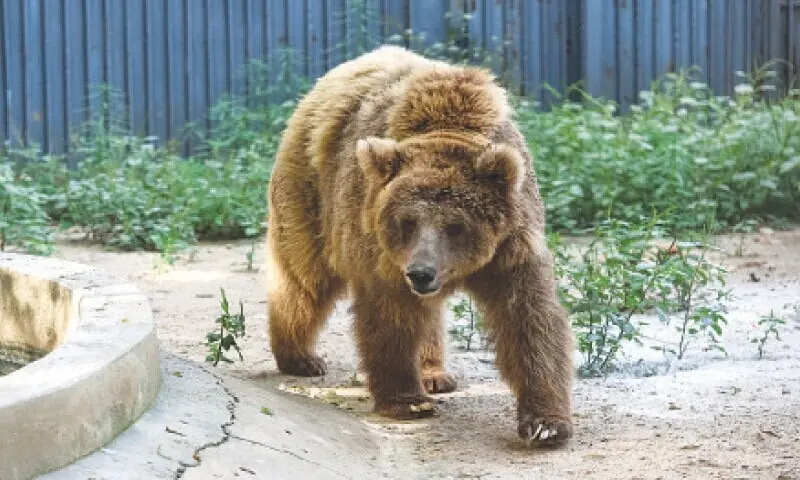The Sindh High Court (SHC) has ordered authorities to submit a report on the health and living conditions of all animals at the Karachi Zoo, following Tuesday’s decision to transfer brown bear Rano to a sanctuary for medical care.
The case of Rano, a female Himalayan brown bear who sparked public protests over her poor health at the zoo, has highlighted the neglect of animals kept in captivity in Karachi. Rano’s relocation was finally ordered on Tuesday by the SHC after a petition was filed to recognize his deteriorating condition.
During the continued hearing of the case today, the SHC asked for a fresh report on all animals kept in captivity at the zoo.
The report will include details about the “physical and psychological health of the animals, living conditions, qualifications and training of zoo staff,” as well as alternative plans for the animals if they are removed from the zoo, according to attorney Jibran Nasir, who represented Rano’s case on behalf of petitioner Jude Allen Pereira.
According to Nasir, details of the staff and their qualifications were sought from the Karachi Metropolitan Corporation (KMC), while the report on the zoo was sought from a committee already notified by the Sindh government to ensure Rano’s transfer, with the addition of a few more members by the court.
The Sindh government has also been directed to visit the zoo and review the facilities provided to the animals.
Nasir called the decision a “great achievement” and said it was made possible by the combined efforts of animal rights activists, experts and the media who raised awareness about the issue.
“We are deeply indebted to the empathy, understanding and judicial will of the honorable court to make a difference not only in the lives of these animals, but also in the education and awareness of society in general regarding animals and their rights,” he said. dawn.com.
Brown bear relocation
Regarding Rano’s relocation, KMC advocate Barrister Asad Ahmed said: “The progress report states that first Rano will be transferred to Islamabad and then to Gilgit.”
He added that training would be provided in preparation for the relocation.
Nasir also said wildlife conservator Javed Mehar’s proposal could be implemented.
Mehar suggested that Rano could be transported to Islamabad both by road and by plane.
“We have made all arrangements in this regard and have transported animals before,” he told the court, adding that training was administered before the animals were transported.
Justice calls for the abolition of zoos
Justice Iqbal Kalhoro, who heard the case, noted in today’s hearing that Rano’s case was not a solitary case.
“It is not a problem for any particular animal, but it affects many animals,” he said.
Kalhoro criticized the current treatment of animals in zoos, saying: “Zoos should be abolished and animals should be in natural habitats.”
He noted that it seemed “very difficult” to maintain zoos here.
Advocate Nasir pointed out before the court that zoos built in the city were subject to the KMC, while drawing the attention of the court to the state of the facilities.
“Here we don’t even have administrative staff to tell us if we can give food to the animals or not,” he said.
He also pointed out that the Karachi Zoo employed only one veterinarian, to which the KMC advocate replied that no new appointments had been made as they were prohibited.
Judge Kalhoro noted: “I also saw zoos in my childhood: they were in very bad condition and many animals were injured.
“You make money at the zoo but you don’t spend it on animals.”
He regretted that Pakistan “did not have the concept of a national park” as an alternative to zoos.
“Zoos outside (the country) are not in those conditions; there are no cages there,” he said. “We want to abolish these cages.”
Nasir noted that one of the oldest zoos in Islamabad had also been closed earlier.
Kalhoro told the court: “File a petition on whether there should be a zoo or not, then we will examine the law on this.”
The SHC adjourned the hearing for two weeks, seeking a progress report for the next hearing.
Rano’s oblivion
Rano was reportedly brought to the Karachi Zoo in 2017, along with an Asian black bear that died in 2020.
Forced to live in solitary confinement in a bleak cell, her “unusual behavior” was noted in February in a report by a committee investigating her condition, which suggested she was “under stress.” The committee recommended relocation to a sanctuary in Punjab, as well as DNA testing to determine its species.
Animal rights activists say Rano is a Himalayan brown bear, a critically endangered species, and not a Syrian species as zoo officials claim.
While the committee expressed satisfaction with the bear’s diet and physical health and found no wounds or injuries on its body, it noted “a loud noise” during the visit. The report stated that the noise appeared to be “beyond the allowable decibels.”
Although the KMC had directed the committee to release the report, it was later learned that it was not implementing its recommendations as Rano continued to languish in the Karachi zoo.
Earlier this month, it emerged that the bear had suffered a head injury and the wound was infested with maggots due to lack of care.
When contacted, Karachi Metropolitan Corporation spokesperson Daniyal Sial admitted that the bear was undergoing treatment and added that the wound was self-inflicted by Rano by hitting its head on the bars of its cage.
A case on Rano’s condition was finally heard this month after animal rights activist Pereira petitioned the SHC for recognition of animal cruelty towards the bear.
During the hearing of the case on Tuesday, Justice Kalhoro expressed his anger with the Karachi Metropolitan Corporation (KMC) and said, “How could the bear be kept in such conditions?”
He ordered the bear to be handed over to the Islamabad Wildlife Management Board, a move Pereira called a “big victory for Rano.”








